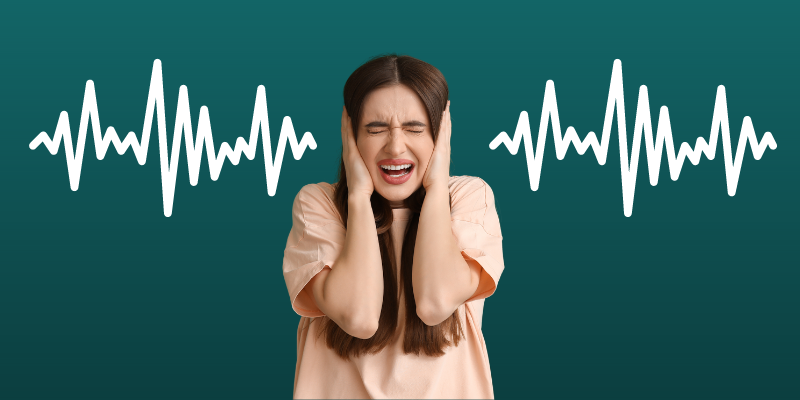
Dining out is a social experience that allows us to indulge in delicious food while spending time with family, friends, or colleagues. However, the overall dining experience can be influenced by various factors, including the noise level in the restaurant.
A higher noise level can impact our enjoyment of the restaurant’s food, conversation, and overall ambience. This blog explores how exposure to noise in an eatery can ultimately affect not only a person’s health and well-being but also their social interactions, communication, stress level, and willingness to return.
Ability to converse.

The average volume of speech is 60 – 65dB(A). But the average eatery is 71dB(A), with some peaking over 100dB(A). To put that in perspective, we calculate speech volume in decibels (dB), which is a logarithmic scale. So, +3dB is double the volume, and +10 is ten times the volume. You can see how 71dB(A) is entirely disproportionate to speech volume. This means the instant you enter an average eatery; you must raise your voice to be heard.
We dine out to see AND hear our friends we are there to connect with, so our ability to converse is impeded the moment we walk into the average eatery.
Increased listening effort and voice strain.
Straining to hear can lead to frustration and a sense of isolation, making it difficult to engage in meaningful conversation. Moreover, if diners need to shout or raise their voice to be heard, it can be an unpleasant experience and might result in strained vocal cords.
Affects your sense of taste.
Noise affects the perception of taste. Loud noise can affect the way we perceive flavours, making it difficult to distinguish between different tastes. It is known as ‘sonic seasoning’ and excessive noise can affect your sense of taste.
Research suggests that loud or distracting noises can interfere with our ability to fully perceive and appreciate flavors. High levels of background noise can reduce our perception of saltiness, enhancing the perception of bitterness. Restaurant noise and road traffic noise decrease the liking of food at all volumes – the louder the noise becomes, the worse the food tastes. Background noise also suppresses the auditory cues normally heard when we eat various crisp and crunchy items, affecting the food’s expected crispiness. Individual sensitivity to taste and the specific characteristics of the background noise can influence these effects also. Age, noise sensitivity and gender were found to directly influence relative food liking.
Meanwhile, relaxing music at a soft volume increased the liking of food.
There is so much research on the topic of how lively eateries affect our sense of taste, I dedicated a whole other blog to it. You can read more on these fascinating facts HERE.
Stress response.

Restaurants’ physical and social environments influence diners’ overall experience, emotions and biological functions. A strong correlation exists between mental health conditions being exacerbated by noise exposure.
Loud noise illicits a stress / anxiety response that can put people in a heightened state of arousal. The average volume the fight or flight system kicks in is 71dB(A), roughly the volume you naturally start to raise your voice to be heard. With the average eatery noise level at 71dB(A), your fight or flight response kicks in the moment you enter the average eatery.
Our mood affects our food.
If the fight or flight system kicks in the moment you enter an eatery, this induces raised levels of adrenaline, norepinephrine and cortisol (the stress hormone). Together, these increase the heart and respiratory rates and can create a sensation of stress, anxiety and even fear.
No one wants to feel anxious when enjoying their dinner. The more anxious a diner is, the less comfortable they will feel and the less chance of them returning to the eatery. And depending on diners’ stress levels the day they enter an eatery, someone who is already feeling tired, stressed or anxious before entering that restaurant, will have an overwhelming response to turn and leave.
Affects Physical Health.
Exposure to environmental noise in everyday activities could influence other health issues beyond mental health, such as cardiovascular disease, insomnia, and cause progressive hearing loss.
It affects the taste of your…. Gasp…. Coffee.

Studies show that most diners are less sensitive to the taste senses associated with coffee while under the influence of noise. You know the taste senses I am talking about….. The sweetness, the bitterness, the acidity, the aroma, the flavour….. Under the influence of noise they don’t experience these to their full effect and are less willing to pay and purchase the coffee if they drank it while experiencing loud sounds.
The senses of bitterness, aroma and intensity are most affected. Louder noise diminished the ability to attend to specific elements of the experience. As a result, consumers added more sugar to their coffee to drink it. We all know good coffee should not have sugar added; a good coffee is perfect when it is created.
Again, I love coffee, it is my morning companion I never leave home without. So many more fun facts on this topic, read the full blog HERE.
Complaints
Excessive noise is also a significant complaint of diners, secondly only to poor service.
Conclusion
In conclusion, the noise level is a crucial aspect of the dining experience and can significantly impact the diner’s experience in that restaurant and likelihood to return. High noise levels can affect conversation, the perception of taste, increase stress levels, and overall lead to a less enjoyable dining experience. By reducing noise levels, restaurants can create a more pleasant dining environment conducive to meaningful conversation and the enjoyment of delicious food.
And of course, to find an eatery that is conversation friendly and won’t initiate a flight or fight response, use the Ambient Menu search function.

Author: Laura Drexler
Creator of Ambient Menu
Masters of Audiology, Bachelor of Health Science
Presenter: Audiology Australia SA Chapter Conference 2023, Flinders University 2023, SA Gerontology Conference SA 2022, Audiology Unchained (Independent Audiology Australia) 2023
Awards: Audiology Australia Internship Award, Flinders University Early Career Alumni Award, Help Awards AMP Healthcare Herp
Written for: SA Life, 50 So What, Grandparents Magazine
REFERENCES
Alamir, M.A. and Hansen, K. (2021) “The effect of type and level of background noise on food liking: A laboratory non-focused listening test,” Applied Acoustics, 172, p. 107600. Available at: https://doi.org/10.1016/j.apacoust.2020.107600.
Alamir, M.A. et al. (2020) ‘The effect of age, gender and noise sensitivity on the liking of food in the presence of background noise’, Food Quality and Preference, 84, p. 103950. doi:10.1016/j.foodqual.2020.103950.
Bravo-Moncayo, L., Reinoso-Carvalho, F. and Velasco, C. (2020) “The effects of noise control in coffee tasting experiences,” Food Quality and Preference, 86, p. 104020. Available at: https://doi.org/10.1016/j.foodqual.2020.104020.
Guedes, D. et al. (2023) ‘Crossmodal interactions between audition and taste: A systematic review and narrative synthesis’, Food Quality and Preference, 107, p. 104856. doi:10.1016/j.foodqual.2023.104856.
Short, A.E. and Williams, G. (2022) “Effects of noise on anxiety related to dining in restaurants,” Music and Medicine, 14(1), pp. 27–38. Available at: https://doi.org/10.47513/mmd.v14i1.806.
Spence, C. (2014) “Noise and its impact on the perception of food and drink,” Flavour, 3(1). Available at: https://doi.org/10.1186/2044-7248-3-9.
